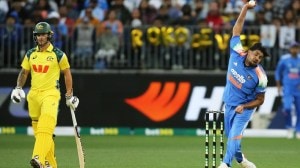Mumbai tense, MNS men target N-Indians in Nashik
Tension gripped Mumbai and Nashik ahead of the possible arrest of MNS chief Raj Thackeray and SP leader Abu Azmi.

Shopkeepers in many parts of Mumbai closed down their shops on Tuesday fearing violence in the city ahead of the possible arrest of Maharashtra Navnirman Sena (MNS) chief Raj Thackeray and Samajwadi Party leader Abu Azmi.
Violence in Nashik
Activists of the MNS attacked fruit-vendors hailing from north India in the Shalimar Chowk area of Nashik on Tuesday, leading to tension in the city. A handful of MNS activists allegedly beat up the vendors and damaged their hand-carts, police said.
Some of the hawkers were injured in the incident and were being treated in government hospitals. The hawkers were mostly from Uttar Pradesh and have been selling seasonal fruits for quiet a long time.
However, MNS General Secretary Vasant Gite denied that his party members were involved in the attack. On Monday night some unidentified persons attacked industrial workers hailing from UP and Bihar following which many of them have left the city, police said. Shops in Nashik road in the city closed down following the incident. City police have deployed force in the areas, police added.
No Anticipatory Bail
The MNS on Tuesday said their chief Raj Thackeray, who is facing possible arrest for making provocative statements against north Indians, will not seek anticipatory bail.
“The MNS Chief has decided that he would not seek any anticipatory bail,” a party spokesman said.
Police on Monday gave an indication that Thackeray and SP leader Abu Asim Azmi will be arrested for making provocative statements, which resulted in incidents of violence across the city last week.
“The cases have been registered on the basis of certain evidence and arrest is mandatory,” Joint Commissioner of Police (Law and Order) K L Prasad said on Monday.
Prasad, while refusing to disclose when the arrests would be made, said the charges under which Thackeray and Azmi had been booked were non-bailable and cognisable.
The city police had registered cases against Thackeray and Azmi on Sunday night at separate police stations under sections 153 (wantonly giving provocation with intent to cause riot), 153 A (promoting enmity between groups on the basis of place of birth, residence, etc), 153 B (assertions prejudicial to national integration) and 117 (abetting the commission of an offence by the public), he said.





- 01
- 02
- 03
- 04
- 05


























